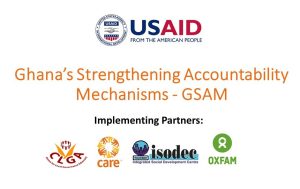 CLGA on Thursday 10th September, 2015 joined other stakeholders at the Capital View Hotel at Koforidua in the Eastern region to launch the GSAM project. The high powered delegation was led by a Board Member and the Legal and Decentralization Advisor, Dr. Eric Oduro Osae ,Deputy Executive Director, Hon. Gladys Gillian Naadu Tetteh with the Assistant Research Officer Awusi Edem in attendance.
CLGA on Thursday 10th September, 2015 joined other stakeholders at the Capital View Hotel at Koforidua in the Eastern region to launch the GSAM project. The high powered delegation was led by a Board Member and the Legal and Decentralization Advisor, Dr. Eric Oduro Osae ,Deputy Executive Director, Hon. Gladys Gillian Naadu Tetteh with the Assistant Research Officer Awusi Edem in attendance.
The launch was chaired by The Kuntihene of the New Juaben Traditional Area, Baffour Nyantakyi Tutu Boateng, in his remarks; the Chairman bemoaned the need for transparency and accountability to dispel misconceptions and perceived corruptness of duty bearers and thanked the USAID for their support in funding such a noble initiative.
Local government officials and traditional leaders in the Eastern and Greater Accra regions welcomed the implementation of the Ghana’s Strengthening Accountability Mechanisms (GSAM) project, describing the intervention as one that would significantly increase participation and transparency in local governance.
The Chief of Party for the GSAM Project, Mr. Clement Nana Tandoh in his briefing on the Project said GSAM basically seeks to strengthen citizens’ oversight of capital development projects to improve local government transparency, accountability and performance. The project will support local CSOs to monitor and disseminate information to citizens on capital development projects of selected district assemblies to enable citizens hold their local authorities accountable and demand improved service delivery. The project is been implemented by CARE International in Ghana, IBIS in Ghana and ISODEC in partnership with selected CSOs including CLGA.
The five-year project, which is to be implemented in 100 districts across the ten regions of Ghana, is designed to strengthen social accountability by improving information to Civil Society Organizations (CSOs) to enhance their capacity to demand accountability. The goal of the project is to strengthen citizens’ oversight of capital development projects to improve local government transparency, accountability and performance.
The 100 districts across the ten regions of Ghana which it’s to be implemented are; – for the Greater Accra and Eastern regions, the districts are Shai Osudoku and Ayensuano, Kwahu South, Birim North and South, Lower and Upper Manya Krobo, Akuapim South, Fanteakwa, Asuogyaman, Kwaebibirem, Suhum and Kwahu Afram Plains, respectively.
The project is being implemented by CARE International, IBIS and the Integrated Social Development Centre (ISODEC) with funding from the United States Agency for International Development (USAID) and aimed at strengthening citizens’ oversight of capital development projects to improve local government transparency, accountability and performance.
Mr Sambo, who represented the Regional Minister, Hon. Antwi-Bosiako Sekyere, said development projects are undertaken with the taxpayers’ money and therefore need to be handled judiciously.
In the keynote address of the Regional Minister which was read on his behalf by the Regional Coordinating Director, he noted that the object of GSAM fits into Pillar 4 of the Government of Ghana’s Better Ghana Agenda which outlines support for citizens-based monitoring and evaluation of public policies and programs. He thanked USAID for the support funding GSAM.
“Through the GSAM project, citizens would be better informed and involved in the planning and execution of district assembly projects by their district assemblies and there would be responsive and accountable governance on the part of duty bearers.”
During the second session, Mr. Bishop Akolgo, Executive Director of ISODEC gave a brief presentation on the E-platform. The E-platform integrates a website and the ability to receive feedback directly from citizens through sms, voice, videos and pictures. The E-platform will also enable assemblies to have video conferencing as part of their public engagement activities.
Micheal Tettey, the Zonal M&E Officer and Mamunatu Azaanab, Zonal Project Officer gave presentations on Sub-grant Management and the Role of Assemblies and the Composition and Functions of District Steering Committees respectively.
Mr. Clement Nana Tandoh led discussions on the CSOs selection process, MOUs, Annual Action Plans, Selection of Capital Projects and the Distribution of Motor Bikes.
The session was interspersed with plenary sessions where participants voiced their opinions and sought clarifications.
